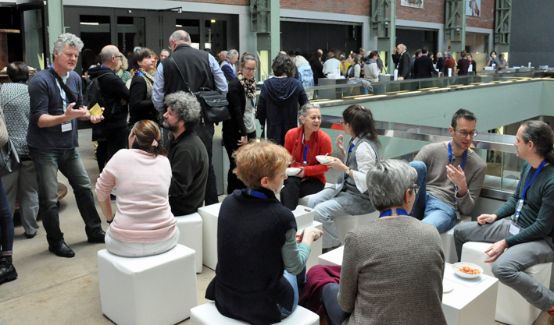Lobbying and entrepreneurship as a role model
The Swiss Association of Music Schools hosted the 9th edition of the Forum Musikalische Bildung (FMB) at the Trafo Baden on January 17 and 18. The theme was "Paths to the goal - opportunities in a changing society".

The FMB has been held every two years since 2012 and is a firm fixture on the agenda of many education managers. Christine Bouvard Marty, President of the Swiss Music Schools Association (VMS), welcomed an impressive number of visitors this year, the majority of whom were present on both days: well over 400 day tickets were sold.
In 2007, the then President of the VMS, Hector Herzig, launched the FMB in order to anchor music education in society's consciousness as an important part of overall education. This concern culminated in the grandiose victory of the referendum on "Musical Education" in 2012. In the first five forums (2007 to 2012, initially still held annually), the political aspects of education were consequently given strong emphasis alongside music education and future topics. As the implementation of Article 67a of the Constitution "Music Education" is now based on the four-year cycle of the Culture Dispatch, the third period of which (2021-2024) is entering the decisive phase of parliamentary deliberation this year, it made sense to focus on politics this time too.
Human right to music
Markus Ritter, President of the Swiss Farmers' Association and CVP National Councillor (SG), gave an informative and entertaining presentation on the mechanisms of power in Bern. Under the title "Being politically successful - what you can learn from farmers", he presented a seven-point guide. As an extremely successful and self-confessed lobbyist, Ritter has repeatedly proven that his recipes lead to success: "Doing the right thing, at the right time, in the right form, with the right person, in the right place, is fundamental to success," he stated.
Max Fuchs, Honorary Professor of Education at the University of Duisburg-Essen, also has a wealth of political knowledge. Fuchs was awarded the Federal Cross of Merit for his achievements as former Chairman of the German Cultural Council and as a member of the Federal Youth Board of Trustees. In his lecture, he derived a "human right to music" in a scientifically stringent manner, based on the UN's "Universal Declaration of Human Rights" (1948).
David Vitali from the Federal Office of Culture (BAK), whose responsibilities include music education, stood in as speaker for the Director of the BAK, Isabelle Chassot, who was injured in an accident. Vitali explained the cultural message currently being discussed in parliament and highlighted the plans to implement the promotion of talented musicians. The speaker then took part in a "table ronde" chaired by Jodok Kobelt together with Christine Bouvard Marty, Max Fuchs and the Director of the Swiss Association of Municipalities, Christoph Niederberger.
Under the spell of digitalization
The FMB traditionally sees itself as a source of inspiration for future concepts in education. The second day began with Jan Rihak, start-up founder and developer of "Classtime", a web-based participation and examination platform for modern teaching that has already been successfully implemented in various countries. In his presentation "An entrepreneurial spirit with model character for educational institutions?", he presented learnings from the program development and offered them to the audience as an aid for possible projects of their own.
In place of Peter Röbke, who was ill, Michaela Hahn, Professor of Music School Research at the University of Music and Performing Arts Vienna, spoke on the topic of "Aspects of contemporary music education". She took a look at the roots and development of the music school movement up to the present day, outlined the social mission of music education institutions and presented some inspiring European model projects.
One of Germany's leading sociologists, Armin Nassehi, full professor at the Ludwig Maximilian University of Munich, spoke about the importance of digitalization in his presentation "Shaping education in the digital society". He discussed the question: "For which problem is digitalization the solution?" and placed this epochal achievement alongside other world-changing inventions such as the printing press or the steam engine. As in all areas of life, digitalization is also a fact of life in education. However, technology should be placed at the service of educational goals.
Well framed and good practices
As always, the musical program was of exquisite quality. The Quadrifoglio clarinet quartet had already won first prizes with distinction in the Thurgau and Swiss Youth Music Competitions (SJMW). These highly musical young people therefore also earned a special VMS prize. The second VMS prize went to the rock band Weird Fishes. They had already caused a sensation at the SJMW Jazz&Pop and blew the audience away with their progressive sound. The hit parade habitué Gustav brought the first day to a close. He has been known for years for his educationally motivated school concerts.
For the third time, the VMS held its competition for pioneering music school projects. This time there were no runners-up, but three first places: The "Ecole de Jazz et de Musique Acutelle" (EJMA) earned one of them for its "Département de musique assistée par ordinateur (MAO)" project, according to the expert jury chaired by Felix Bamert. The next prize went to the Swiss Jazz School Bern (SJS) for the project "iMPro-Webapp: The digital teaching tool for improvisation". The Audience Award went to the Olten Music School with "Open Music School Olten - More Space and Time for Music".
The next FMB will take place on January 21 and 22, 2022 in Baden.







